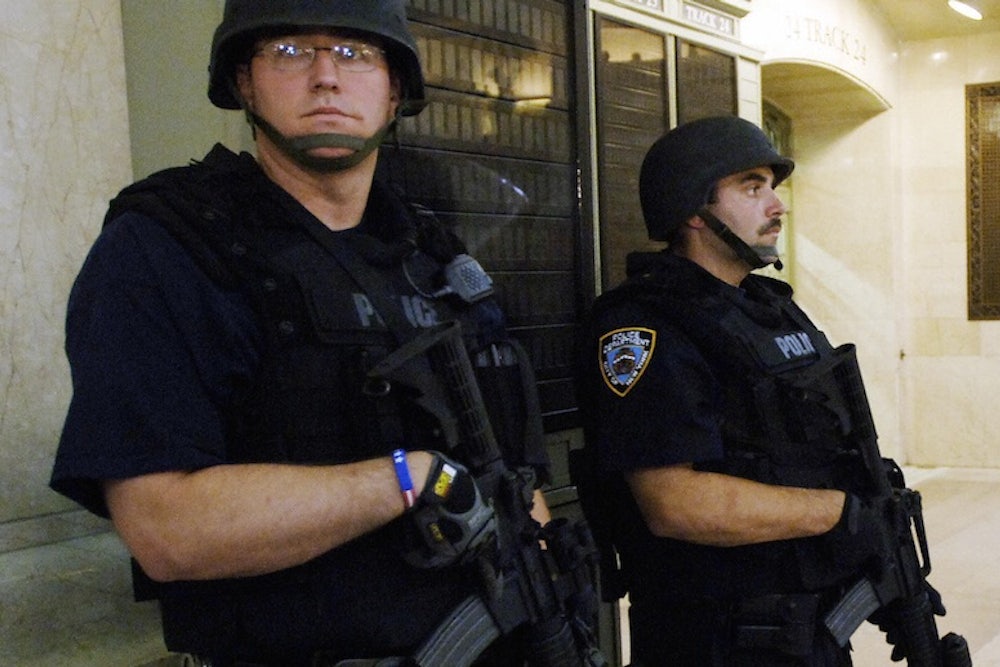The New York Police Department announced this week a new approach to community policing. By Commissioner Bill Bratton's account, the new strategy will allow more precinct cops to spend more time in neighborhoods, leading to better mutual relations between police and New Yorkers.
It also happens that these Strategic Response Groups will arm 350 police officers with "long rifles and machine guns," the commissioner said during a Thursday news conference. "Unfortunately," he added, such materiel is "sometimes necessary in these instances."
The instances in question: possible terror attacks and large crowd assemblies. "It is designed for dealing with events like our recent protests, or incidents like Mumbai or what just happened in Paris," Bratton said. By such phrasing, a reasonable listener might infer the recent protests in New York begat horror on the scale of hundreds dead and wounded over a coordinated series of bombings and shootings (Mumbai) or the slaughter of a magazine's editorial staff and police and civilians and an accompanying hostage crisis that killed even more (Paris).
Rather, the protests in New York were a triumph of peaceful democratic expression, in which tens of thousands of people of all colors, creeds and classes, marched peacefully through the heart of America's largest city, joining as a united voice to call for social justice. Now, it happened that the actions that spurred this action were the unaccountable killings of civilians by cops. Sure, you'd have to be blind to miss the occasional "fuck the police" cardboard sign. But death, mayhem, and disorder, the protests were not. They just happened to piss off many of New York's Finest.
Friday morning, the Partnership for Civil Justice Fund, for one, jumped on the association, calling for the newly announced police groups to be disbanded. "Thousands have marched in a massive civil rights movement demanding police reform," the group's executive director, Mara Verheyden-Hilliard, said in a news release, "and the NYPD has decided to respond to the community instead by arming the police with machine guns." Since at least late last year, in fact, Bratton, union brass, and the rank-and-file have been treating elected leaders and citizens as some sort of invading force. Police have been shunning the mayor, turning police funerals into spectacles, and slouching on the job just to show the city what it's like to live without them making ticky-tack arrests. Most of us in New York did just fine, actually.
The police position makes more sense given some of the surrounding circumstances. The police are in a contract negotiation with the city; any point of leverage, you can expect them to use. Also, when Ismaaiyl Brinsley drove to town explicitly to kill police, claiming on Instagram that it was some sick tit-for-tat for police killing Mike Brown and Eric Garner, he scrambled the equation. By aligning himself nominally against the same predicating force as the protests—cops' unaccountable use of lethal force—Brinsley unjustly yoked the 25,000 people who flooded down Broadway to his act by association.
New York cops should know better. Not every New York cop put a fatal chokehold on Eric Garner, and in fact, no protester killed Wenjian Liu and Rafael Ramos in their squad car. Police watched over those demonstrations, in which thousands of people vented their anger, their fear, their frustration, and yes, at times, their hatred. They did so peacefully, with a political agency that comes from feeling you have a voice. And it was New York's finest who watched over them and blocked cross-street traffic, who helped provide the venue for that voice. The city called for better policing, and it was good policing that allowed them to do so. The protests could have been a watershed moment for cop-citizen relations, if police had taken the message of Black Lives Matter as a wake-up call rather than fighting words.
At best, it's sloppy for Bratton to tell the city he'll have counter-terrorism forces armed to the teeth, watching over protests with the same force police reserve for bombings and mass shootings. At worst, it conflates peaceful assemblies with villainy. If he wants his announcement to have a chilling effect on demonstrators, he may succeed. He should also ask himself whether broad, peaceful protests are really the worst thing for the city and for the safety of his officers in tense times.
